|
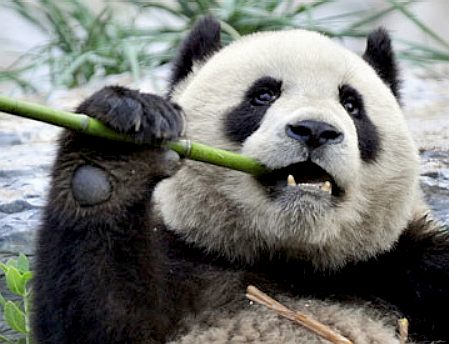
The World Wide Fund for Nature (WWF) is an international non-governmental organization working on issues regarding the conservation, research and restoration of the environment, formerly named the World Wildlife Fund, which remains its official name in
Canada and the United
States. It is the world's largest independent conservation organization with over 5 million supporters worldwide, working in more than 100 countries, supporting around 1,300 conservation and environmental projects. WWF is a foundation, in 2010 deriving 57% of funding from individuals and bequests, 17% from government sources (such as the World Bank, DFID, USAID) and 11% from corporations.
The group says its mission is "to halt and reverse the destruction of our environment". Currently, much of its work focuses on the conservation of three biomes that contain most of the world's biodiversity: forests, freshwater ecosystems, oceans and coasts. Among other issues, it is also concerned with endangered species, pollution and climate change.
OCEANS
AND COASTS
Plastics and other marine debris that can float may persist in the oceans for years, traveling the currents. Some of this material accumulates in the centers of ocean gyres, creating great garbage patches. The term “garbage patch” brings to mind floating islands of trash, but little of the debris can be seen on the surface. Garbage patches, instead, are areas where concentrations of flotsam and jetsam, mostly small pieces of plastic, are particularly high. This litter can distribute toxic chemicals throughout the oceans, snag and tear corals, and harm animals if they ingest pieces of plastic or become entangled in the debris.
When toxic chemicals and metals enter the environment, organisms may absorb them through their skin or ingest them in their food or water. Animals higher in the food chain accumulate these toxins in higher and higher concentrations, a process called biomagnification. Top
predators - including fish, birds, and mammals - can have much higher levels of these toxins in their bodies, making them more likely to experience the diseases, birth defects, genetic mutations, and other deleterious effects of these poisons.
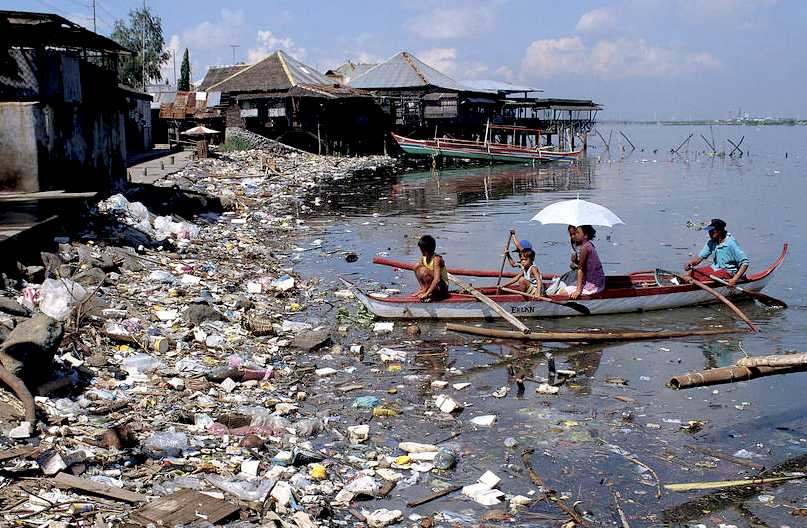
ACIDIFICATION
- ADRIATIC
- ARCTIC
- ATLANTIC
- BALTIC
- BERING
- CARIBBEAN
- CORAL
- EAST
CHINA
ENGLISH
CH - GOC
- GULF
MEXICO - INDIAN
- MEDITERRANEAN
- NORTH
SEA - PACIFIC
- PERSIAN
GULF - SEA
JAPAN
STH
CHINA - PLASTIC
- PLANKTON
- PLASTIC
OCEANS - SEA
LEVEL RISE - UNEP
HISTORY
The idea for a fund on behalf of endangered animals was initially proposed by Victor Stolan to Julian Huxley in response to articles he published in the
Observer. This proposal led Julian Huxley to put Victor Stolan in contact with Max Nicholson, a person that had had thirty years experience of linking progressive intellectuals with big business interests through the Political and Economic Planning think tank. Max Nicholson thought up the name of the organization.
The Observer published
the first of three extraordinarily influential articles by Julian Huxley
on the 13 November 1960, that led to the founding of the World Wildlife Fund (WWF). The header of the first article served as a rallying cry: "Millions of wild animals have already disappeared from Africa this century. Does the wildlife of the continent now face extinction – threatened by increases in population and the growth of industry in the emergent nations? What, if anything, can be done to safeguard it?"
Huxley had been on a tour of 10 central and east African countries for Unesco and saw that conservation was an issue to eclipse all others. "Politics we shall always have with us, but if wildlife is destroyed, it is gone forever, and if it is seriously reduced, its restoration will be a lengthy and expensive business." The articles explained the threats, including overgrazing of livestock and poaching, to African biodiversity. They were illustrated with Huxley's surprisingly successful photographs – a young rhino in Kenya, a bull giraffe in Natal, a fish eagle spreading its wings high above the Murchison Falls national park, Uganda. Reading the articles now, the tone seems very much of its time but none the worse for that: authoritative, patrician and calm. Huxley writes like a doctor with bad news to impart who wishes to spare his patient undue alarm.
In every account of the founding of the WWF, Max Nicholson, environmentalist, author, ornithologist and director general of Britain's Nature Conservancy, is credited as its architect. So where did Huxley fit in? According to Joe Cain, senior lecturer in science history at
University College London, Huxley was a "classic ideas man with a supreme confidence in science, a way of catching the mood of a moment and of seeing his way through to a solution." Nicholson was a "day-to-day general manager, rolling up his sleeves, getting his hands dirty, working on data".
But as one unravels the WWF's beginnings, it emerges that what is now the world's largest non-governmental conservation charity, with 5 million members, might not have started at all without the contribution of an obscure but fascinating third man.
VICTOR
STOLAN
Enter Victor Stolan: hotel owner, Czechoslovakian refugee, Observer reader – and unsung hero. Stolan had no knowledge of conservation and, unlike the eventual founders of the WWF (ornithologists all – birds of a feather), no binoculars slung round his neck. But when he read Huxley's pieces in the Observer, he recognised that there was no time to be lost. He knew the answer to the paper's challenge: an international fundraising organisation must be founded without delay. On 6 December 1960, he sat down at his home in South Kensington, got out his headed notepaper and, on a typewriter with a worn ribbon, wrote to Huxley.
"It was with admiration and anxiety that I read your articles in the Observer. Only reluctantly, I add mine to the large number of letters etc which you must have received in response to your outstanding and astounding survey…."
He kept the congratulations brief and pressed on to a criticism that, by implication, extended to Huxley himself. "Since my naturalisation, I am proud to call this country mine, but I cannot help feeling that it has become a country of understatements, of gentle talk, with not enough push…" And "push" was what Stolan went on to do. He urged Huxley to put him in touch with a "single and uninhibited mind… with whom ideas can be developed and speedilly [sic] directed towards accumulating some millions of pounds without mobilising commissions, committees etc as there is no time for Victorian procedure".
He wrote in the spirit of someone who believes he can change the world. To his credit, Huxley responded positively and put him in touch with Nicholson. They met in early January 1961 and Nicholson encouraged Stolan to put his ideas on paper. It was back to the typewriter for Stolan who produced a brilliant, lengthy and eccentric memorandum. In it, he argued that the Pope and Archbishop of Canterbury should be petitioned: "Nobody is in too high a place to lend a hand to defend creation." Further – and more cannily – he proposed "new tycoons" be approached for funds and encouraged to create a "shining monument in history".
Nicholson was impressed enough with Stolan's suggestions to consult Guy Mountfort, director of a large advertising agency, to see if they might work. He got the thumbs up. It was, as Nicholson later acknowledged, a turning point. Three months later, in May 1961, Nicholson invited a group of important figures, including Peter Scott, the ornithologist who later become the WWF's first chairman, along with Huxley, Mountfort and Stolan, to consider Nicholson's draft document: "How to Save the World's Wildlife". Half-a-dozen more meetings followed in the spring and summer of 1961.
Over time, however, Stolan was dropped from these meetings and is reported to have been bitterly hurt by the exclusion. What went wrong? Nicholson's sniffy letter to Huxley, written on 9 January 1961, in which he records his first impressions of Stolan, tells all. Stolan's record as an hotelier ("an unfortunate experience with a country hotel") did not cut much ice and his Czechoslovakian origins were disdainfully noted. "Mr Stolan is rather too much the naive enthusiast and rather too little the practical man of affairs to be very much help," Nicholson
concluded. Reading his letter 50 years on, one feels a keen vicarious indignation. For Stolan's naive enthusiasm was invaluable, along with his recognition that fine newspaper articles were not on their own enough and that an Englishman's words must be turned into deeds.
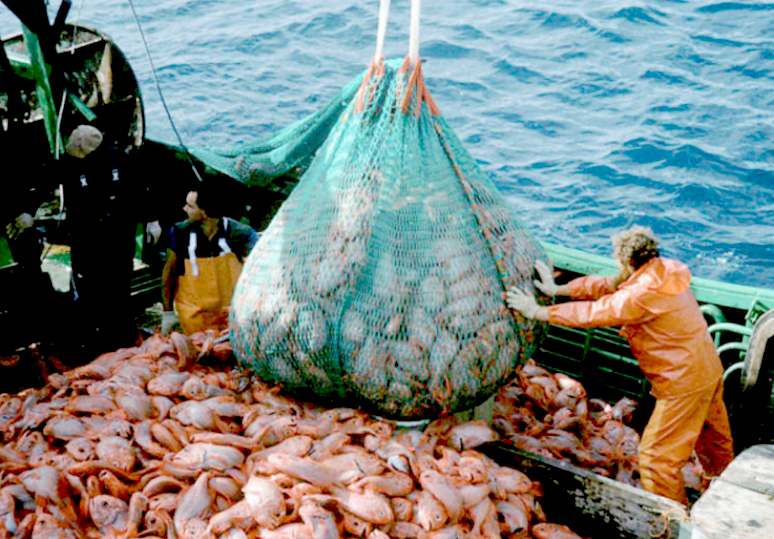
According
to the WWF, the United States is one of the largest markets for imported seafood in the world, with more than 5.3 billion pounds passing through the border each year, worth almost $18 billion annually. Unfortunately right now we simply cannot tell if the seafood we eat is legally caught from the ocean because our current laws are not strong enough to trace from bait to plate.
CONCEPTION
APRIL 1961
The
WWF was conceived on 29 April 1961, under the name of World Wildlife Fund, and its first office was opened on 11 September that same year in Morges,
Switzerland. Godfrey A. Rockefeller also played an important role in its creation, assembling the first staff. Its establishment marked with the signing of the founding document called Morges
Manifesto that lays out the formulation ideas of its establishment. A separate organization, The American Conservation Association, was merged into the WWF.
“...They need above all money, to carry out missions and to meet conservation emergencies by buying land where wildlife treasures are threatened, money, for example, to pay guardians of wildlife refuges ...for educations among those who would care... For sending experts to danger spots and training... Making it all possible that their needs are met before it is too late.” -
Morges Manifesto
WWF has set up offices and operations around the world. It originally worked by fundraising and providing grants to existing non-governmental organizations, based on the best-available scientific knowledge and with an initial focus on the protection of endangered species. As more resources became available, its operations expanded into other areas such as the preservation of biological diversity, sustainable use of natural resources, the reduction of pollution, and climate change. The organization also began to run its own conservation projects and campaigns, and by the 1980s started to take a more strategic approach to its conservation activities.
In 1986, the organization changed its name to World Wide Fund for Nature, to better reflect the scope of its activities, retaining the WWF initials. However, it continues to operate under the original name in the United States and
Canada.
That year was the 25th anniversary of WWF’s foundation, an event marked by a gathering in Assisi, Italy to which the organisation’s International President
HRH Prince Philip, the Duke of Edinburgh, invited religious authorities representing Buddhism, Christianity, Hinduism, Islam and Judaism. These leaders produced The Assisi Declarations, theological statements showing the spiritual relationship between their followers and nature that triggered a growth in the engagement of those religions with conservation around the
world.
In the 1990s, WWF revised its mission to: “Stop the degradation of the planet’s natural environment and to build a future in which
humans live in harmony with nature, by:
• conserving the world's biological diversity
• ensuring that the use of renewable natural resources is sustainable
• promoting the reduction of pollution and wasteful consumption.”
WWF scientists and many others identified 238 ecoregions that represent the world's most biologically outstanding terrestrial, freshwater and marine habitats, based on a worldwide biodiversity analysis which the organization says was the first of its
kind. In the early 2000s (decade), its work was focused on a subset of these ecoregions, in the areas of forest, freshwater and marine habitat conservation, endangered species conservation, climate change, and the elimination of the most toxic chemicals.
We shan't save all we should like to, but we shall save a great deal more than if we had never tried. — Sir Peter Scott
In 1996, the organization obtained general consultative status from UNESCO.
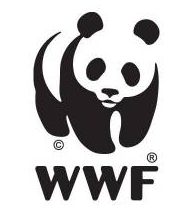
Panda symbol
The Giant Panda mascot of WWF originated from a panda named Chi Chi that was transferred from the Beijing Zoo to the London Zoo in the same year of the establishment of WWF. As the only giant panda residing in the Western area at that time, along with its physical features and status as an endangered species, panda is seen to serve the need of a strong recognizable symbol of the organization. Moreover, the organization also needs an animal that would have an impact in black and white printing. The logo was then designed by Sir Peter Scott from the preliminary sketches made by a Scottish naturalist, Gerald Watterson.
Current conservation approach
WWF's current strategy for achieving its mission specifically focuses on restoring populations of 36 species (species or species groups that are important for their ecosystem or to people, including elephants, tunas, whales, dolphins and porpoises), and ecological footprint in 6 areas (carbon emissions, cropland, grazing land, fishing, forestry and water).
The organization also works on a number of global issues driving biodiversity loss and unsustainable use of natural resources, including finance, business practices, laws, and consumption choices. Local offices also work on national or regional issues.
WWF works with a large number of different groups to achieve its goals, including other NGOs, governments, business, investment banks, scientists, fishers, farmers and local communities. It also undertakes public campaigns to influence decision makers, and seeks to educate people on how to live in a more environmentally friendly manner.
Publications
WWF publishes the Living Planet Index in collaboration with the Zoological Society of London. Along with their ecological footprint calculations the index is used to produce a two yearly Living Planet Report to give an overview of the impact of human activity on the world.
The organization also regularly publishes reports, fact sheets and other documents on issues related to its work, in order to raise awareness and provide information to policy and decision makers.
Work with governments
The organization works with governments as collaborator and lobbyist.
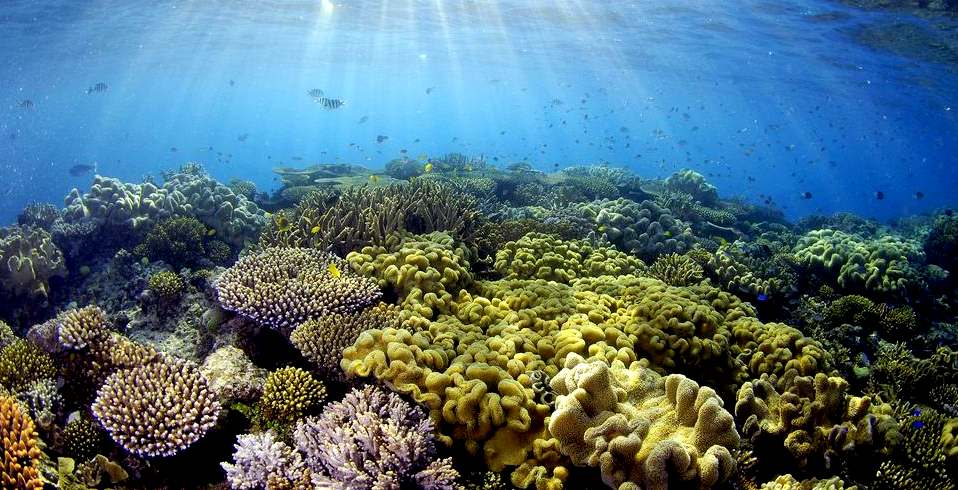
Policy making
Policies of the WWF are made by the board members who are elected for three- year terms. The Executive Teams guides and develops WWF's strategy. There is also a National council which stands as an advisory group to the board and finally a team of scientists and experts in conservation who research for WWF. National and international law plays an important role in determining how habitats and resources are managed and used. Laws and regulations become one of the organization’s global priorities. The organization convinces and helps governments and other political bodies to adopt, enforce, strengthen and/or change policies, guidelines and laws that affect biodiversity and natural resource use. It also ensures the governments to consent and/or keeps their commitment to international instruments relating to the protection of biodiversity and natural resources.
In 2012 David Nussbaum, Chief Executive of WWF-UK, spoke out against the way shale gas is used in the UK saying, "the Government must reaffirm its commitment to tackling climate change and prioritise renewables and energy efficiency"
Criticism
WWF has been accused by a number of environmental groups and campaigners, such as Corporate Watch and PR Watch of being too close to businesses to campaign objectively. WWF claims partnering with companies such as
Coca-Cola, Lafarge and IKEA will reduce their impact on the environment. WWF received €56 million
(US$80 million) from corporations in 2010 (an 8% increase in support from corporations compared to 2009), accounting for 11% of total revenue for the year.
Project Lock
In 1988, Prince Bernhard, former president of the WWF, sold paintings for
GBP700,000 to raise money for the World Wildlife Fund. The money was deposited in a Swiss WWF bank account. In 1989 Charles de Haes, director-general of the WWF, transferred GBP500,000 back to Bernhard, for what De Haes called a private project. In 1991, it was revealed that Prince Bernhard had used the money for an operation called Project Lock to hire KAS International, owned by SAS founder David Stirling, to use mercenaries
- mostly British - to fight poachers in nature reserves.
Mekong River dolphins report
In June 2009, Touch Seang Tana, chairman of Cambodia's Commission for Conservation and Development of the Mekong River Dolphins Eco-tourism Zone, charged that the WWF had misrepresented the danger of extinction of the Mekong Dolphin in order to boost fundraising. He called the WWF report unscientific and harmful to the Cambodian government. He also threatened the Cambodian branch of WWF with suspension unless they meet with him to discuss his charges. Touch Seang Tana later said he would not go forward with false-information charges, and would not make any attempt to prevent WWF from continuing its work in Cambodia.
ARD documentary (July 2011)
The German public television ARD aired a documentary on 22 June 2011, showing how the WWF cooperates with corporations such as Monsanto, providing sustainability certification in exchange for donations (a form of
green-washing). WWF has denied the allegations. By encouraging high-impact eco-tourism, the program alleges that WWF contributes to the destruction of habitat and species it claims to protect.
WWF-India is not active at the tiger reserve given as the
example, but it is active elsewhere seeking to limit adverse tourism impacts and better sharing of tourism benefits to local communities. The program also alleges WWF certified a palm oil plantation operated by Wilmar International, a Singaporean company, on the Indonesian island of Borneo, even though the establishment of the plantation led to the destruction of over 14,000 hectares of rainforest. Only 80 hectares were ultimately conserved, the ARD documentary claims. According to the programme, two orangutans live on the conserved land, but have very slim chances of survival because no fruit trees remain and the habitat is too small to sustain them. To survive, they steal palm nuts from the neighbouring plantation, thereby risking being shot by plantation workers. WWF notes that the plantation filmed is PT Rimba Harapan
Sakti, which has not been certified as a sustainable producer by the Round Table on Sustainable Palm Oil. Aerial photographs show that around 4000 hectares, or about a third of the forest cover, has been conserved.
Hunting
The President of Honor of WWF in Spain used to be King Juan Carlos I, who has been a known hunting enthusiast since 1962. In that year, when he was 24 years old, he was invited by the German Baron Werner von Alvensleben to a hunt in Mozambique. Since then the king has taken part in hunting forays in Africa and Eastern Europe. In October 2004 he was a member of a hunt in Romania that killed a wolf and nine brown bears, including one that was pregnant, according to the Romanian newspaper Romania
Libera. He was also accused by a Russian official of killing a bear called
Mitrofan, supposedly after giving vodka to the animal, in an episode that sparked controversy in Spain, although the claim was never proven. In the same year, according to The Guardian, the Polish government allowed him to kill a European bison in Bialowieza forest, even though it is an endangered species. Further controversy arose in April 2012 when the king's participation in an elephant hunt in Botswana was discovered only after he returned to Spain on an emergency flight after tripping over a step and fracturing his hip. Many Spanish environmentalist groups and leftist parties criticized the monarch's hobby, and the WWF stripped him of the honorary position in July 2012, in an extraordinary assembly by 94% of the votes of the members.
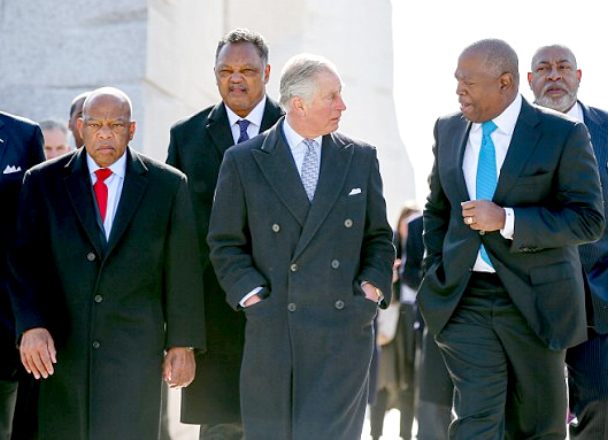
Prince Charles, the UK head of the WWF, is also a keen hunter.
1001 Club
In the early 1970s, Prince Bernhard of the Netherlands and Prince Philip of the United Kingdom, together with a few associates, set up the 1001 Nature Trust, its purpose being to cover the administrative and fund-raising aspects of the
WWF. The club garnered 1001 members who each contributed $10,000 to the trust.
WWF abbreviation dispute
In 2000, the World Wide Fund for Nature sued the World Wrestling Federation (now named
WWE) for unfair trade practices. Both parties had shared the initials
"WWF" since 1979. The conservation organization claimed that the wrestling company had violated a 1994 agreement regarding international use of the WWF initials.
On August 10, 2001, a U.K. court ruled in favour of the World Wide Fund for Nature. The World Wrestling Federation filed an appeal in October 2001. However, on May 5, 2002, the World Wrestling Federation changed its Web address from WWF.com to
WWE.com, and replaced every "WWF" reference on the existing site with
"WWE", as a prelude to changing the company's name to "World Wrestling Entertainment." Its stock ticker also switched from WWF to
WWE.
Abandonment of the initialism did not end the two organizations' legal conflict. Later in 2002, the World Wide Fund for Nature petitioned the court for $360 million in damages, but was not successful. A subsequent request to overturn by the World Wide Fund for Nature was dismissed by the British Court of Appeal on June 28, 2007. In 2003, World Wrestling Entertainment won a limited decision which permitted them to continue marketing certain pre-existing products with the abandoned WWF logo. However, WWE was mandated to issue newly branded merchandise such as apparel, action figures, video games, and DVDs with the
"WWE" initials. Additionally, the court order required the company to remove both auditory and visual references to
"WWF" in its library of video footage outside the United
Kingdom.
WWF in music
No One's Gonna Change Our World was a charity album released in 1969 for the benefit of the
WWF.
Peter Rose and Anne Conlon are music theatre writers, well known for their environmental musicals for children, who were commissioned by
WWF-UK to write several environmental musicals as part of an education plan. Some were narrated by Sir David
Attenborough, and broadcast on television in numerous countries.
Environmentally Sound: A Select Anthology of Songs Inspired by the Earth is a benefit album released in 2006 for
WWF-Philippines, featuring artists that included Up Dharma Down, Radioactive Sago Project, Cynthia Alexander, and Joey Ayala.
In June 2012, WWF launched an online music download store with fairsharemusic from which 50% of the profit goes to the charity.
Notable programs and campaigns
Debt-for-Nature Swap
Earth Hour
Healthy Grown
Marine Stewardship Council
WWF global initiatives
In 2008, through the Global Programme Framework (GPF), WWF is now focusing its efforts on 13 Global Initiatives:
Amazon
Arctic
China for a Global Shift
Climate & Energy
Coastal East Africa
Coral Triangle
Forest and Climate
Green Heart of Africa
Heart of Borneo
Living Himalayas
Market Transformation
Smart Fishing
Tigers
The
WWF conserves endangered species, protects threatened
habitats and addresses global threats. We find long-term
solutions that benefit both people and nature.
In
the news
Nuclear
is too little, too late and too dangerous
In announcing the start of a new Energy Review today,
only two years after the last comprehensive review that
prioritised energy efficiency and renewable energy
against nuclear power, Tony Blair has signaled that he
has already decided to go for the nuclear option.
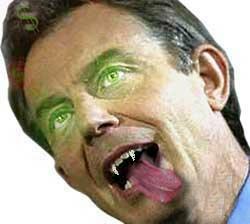
Tony
Blair - promises like piecrust
Tony
Blair has also signaled a shift away from legally binding
targets key to tackling climate change. Please e-mail
your MP to urge Tony Blair not to turn his back on
climate change. Visit our information
page to find out more.
Ask
your MP to urge Tony Blair not to undermine the Kyoto
Protocol or retreat from a target-based approach to
cutting greenhouse gas emissions.
Tony
Blair signalled a fundamental shift away from legally
binding targets which are key to driving down greenhouse
gas emissions and tackling climate change. Energy
ministers are alarmed about the Prime Minister's change
of emphasis.
Dr Ashok
Sinha, Director of Stop
Climate Chaos, said "Tony Blair’s recent remarks
on climate change are giving Kyoto’s opponents - in
particular President Bush - the ammunition to kill off
the Protocol. For a Prime Minister who has championed
climate change throughout his EU and G8 Presidencies
Tony Blair is now in real danger of undermining the most
important climate change agreement ever."
Without
legally binding targets, what will make governments take
the necessary steps to slash their emissions? And how
will we know whether we are on track to stop climate
change? We have a fast-shrinking window of
opportunity to act and targets are critical to the
global response that is needed.
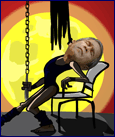
President
Bush loved oil
ACT
NOW: Ask
your MP to urge Tony Blair not to turn his back on
climate change (90 seconds is all it takes).
Or
read
more first Thank
you for your support - the Climate
Change Campaign Team
CLIMATE CHANGE:
RELATED STORIES


|
|
 |
"The
Climate Mash" was hilarious, but the effects of
global warming aren't funny.
Global
warming puts our health, our economy and our environment
at risk. It's time to demand that major polluters like
ExxonMobil and others stop resisting solutions that
could make a real difference.
Your
voice is needed to overcome the polluters who are trying
to bury clean energy solutions. NOW is the time to tell
your elected representatives in Washington that you want
their commitment to solving global warming.
Credits
-
"Climate
Mash"
performed by Bobby
"Boris" Pickett
-
Music
and backup vocals by Andrea
Perry
-
Bush
voice by Austin comic Kerry Awn
-
Flash
animation by Horseback
Salad
-
Lyrics
and script written by Peter Altman
-
"Monster
Mash" song:
"Monster
Mash"
Words and Music by Bobby Pickett and Leonard Capizzi
Copyright © 1973 Dimensional Music Publishing LLC.
d/b/a Acoustic Music (BMI)/
Gary S. Paxton Publications, Inc. (BMI) / Capizzi
Music Co. (BMI)
Worldwide rights for Acoustic Music and Gary S.
Paxton Publications, Inc.
administered by Cherry River Music Co. (BMI)
All Rights Reserved -
Used By Kind Permission
Climate
change is a global challenge and requires a global
solution
Greenhouse gas emissions have the same
impact on the atmosphere whether they originate in
Washington, London or Beijing. Consequently, action
by one country to reduce emissions will do little to
slow global warming unless other countries act as
well. Ultimately, an effective strategy will
require commitments and action by all the major emitting
countries.
The
international response to climate change was launched in
1992, at the Earth Summit in Rio de Janeiro, with the
signing of the United Nations
Framework Convention on Climate Change (UNFCCC).
The Convention established a long-term objective of
stabilizing greenhouse gas concentrations in the
atmosphere "at a level that would prevent dangerous
anthropogenic interference with the climate
system". It also set a voluntary goal of reducing
emissions from developed countries to 1990 levels by
2000 - a goal that most countries did not meet.
Recognizing
that stronger action was needed, countries negotiated
the 1997 Kyoto
Protocol, which sets binding targets to reduce
emissions 5.2 percent below 1990 levels by
2012. The Protocol entered into force on February
16, 2005, which made the Protocol's emissions targets
binding legal commitments for those industrialized
countries that ratified it (the United States and
Australia have not ratified it). In addition, the
market-based mechanisms established under the Protocol,
including international emissions trading and the Clean
Development Mechanism, became fully operational with the
Protocol's entry into force.
Attention
now is turning to strengthening the international
framework for the years following the Kyoto Protocol's
initial commitment period (2008 - 2012). The overriding
challenge is to forge an agreement that includes all
major emitting countries - both developed and developing
- and begins signficant long-term reductions in global
emissions. In 2003, the Pew Center engaged more than 100
experts, policymakers, and stakeholders from nearly
three dozen countries to address this issue. This
initiative continues with the Climate
Dialogue at Pocantico, a series of off-line
discussions among 25 senior policymakers and
stakeholders from 15 countries exploring options for
next steps in the international climate
effort. The final
report of the Pocantico dialogue was released
on November 15, 2005.

CONTACTS:
WWF
US Headquarters
World Wildlife Fund
1250 24th Street, N.W.
Washington, DC 20037
P.O. Box 97180
Washington, DC 20090-7180
(202) 293-4800
WWF International, Gland
Av. du Mont-Blanc 1196 Gland
Switzerland
+41 22 364 91 11
+41 22 364 88 36
UK
Environment Agency
Phone: (011)00-44-1709-389-201
LINKS
& REFERENCE
Youtube
wwfus
Facebook
worldwildlifefund
Twitter
world_wildlife
The
Guardian November 2010 wwf-world-wildlife-fund-huxley
http://www.theguardian.com/environment/2010/nov/07/wwf-world-wildlife-fund-huxley
http://www.youtube.com/wwfus
http://www.facebook.com/worldwildlifefund
http://twitter.com/world_wildlife
https://www.worldwildlife.org/
Greater
London Authority
Phone: (011)020-7983-4000
International
Policy
What's
Being Done
International
Reports
Workshops
& Conferences
Climate
Dialogue at Pocantico
MORE
LOCAL AGENDA 21
UK
PARLIAMENT A-Z HOUSE
OF LORDS A-Z UK
COUNCIL'S
AGENDA 21
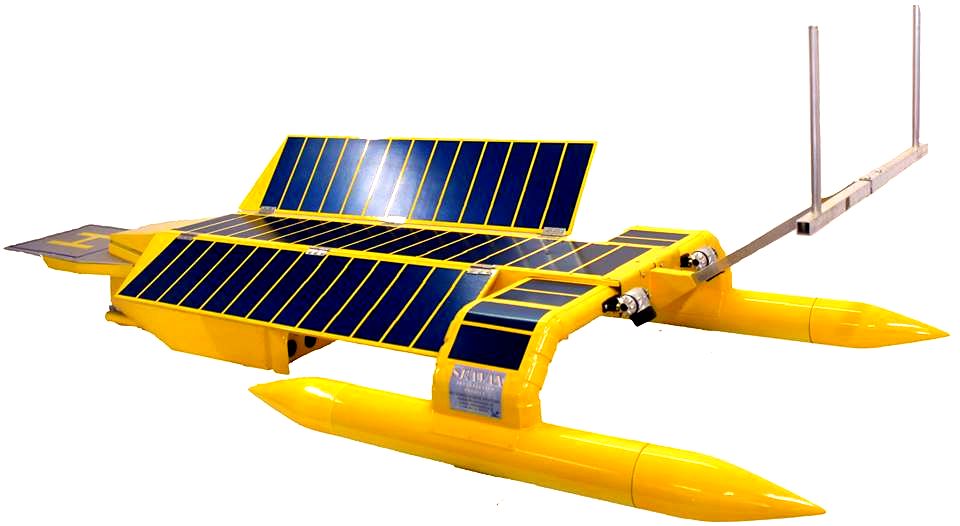
Probably
the world's largest robot vacuum cleaner, the SeaVax uses solar and wind
power to filter plastic from polluted ocean gyres. In so doing this ship
enhances the quality of marine animals such as to help sustainable
fishing for food.
ANIMALS
A to Z
|
AMPHIBIANS |
Such
as frogs (class: Amphibia) |
|
ANNELIDS |
As
in Earthworms (phyla: Annelida) |
|
ANTHROPOLOGY |
Neanderthals,
Homo Erectus (Extinct) |
|
ARACHNIDS |
Spiders
(class: Arachnida) |
|
ARTHROPODS |
Crabs,
spiders, insects (phyla: Arthropoda) |
|
BIRDS
|
Such
as Eagles, Albatross
(class: Aves) |
|
CETACEANS
|
such
as Whales
& Dolphins
( order:Cetacea) |
|
CRUSTACEANS |
such
as crabs (subphyla: Crustacea) |
|
DINOSAURS
|
Tyranosaurus
Rex, Brontosaurus (Extinct) |
|
ECHINODERMS |
As
in Starfish (phyla: Echinodermata) |
|
FISH
|
Sharks,
Tuna (group: Pisces) |
|
HUMANS
- MAN |
Homo
Sapiens THE
BRAIN |
|
INSECTS |
Ants,
(subphyla: Uniramia class:
Insecta) |
|
LIFE
ON EARTH
|
Which
includes PLANTS
non- animal life |
|
MAMMALS
|
Warm
blooded animals (class: Mammalia) |
|
MARSUPIALS |
Such
as Kangaroos
(order: Marsupialia) |
|
MOLLUSKS |
Such
as octopus (phyla: Mollusca) |
|
PLANTS |
Trees
- |
|
PRIMATES |
Gorillas,
Chimpanzees
(order: Primates) |
|
REPTILES |
As
in Crocodiles,
Snakes (class: Reptilia) |
|
RODENTS |
such
as Rats, Mice (order: Rodentia) |
|
SIMPLE
LIFE FORMS
|
As
in Amoeba, plankton (phyla: protozoa) |
|
|
|









